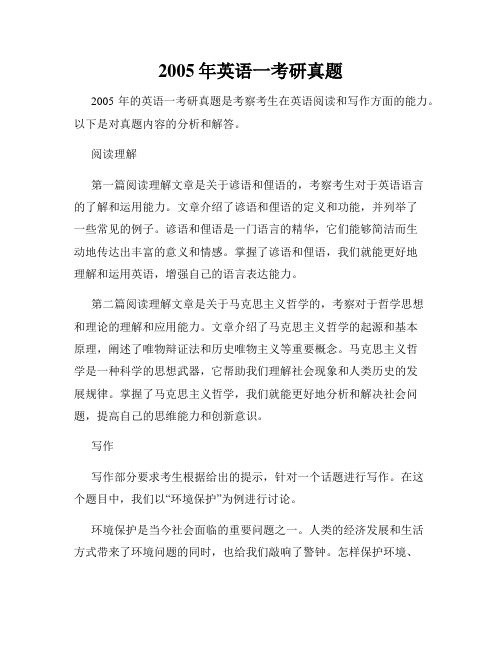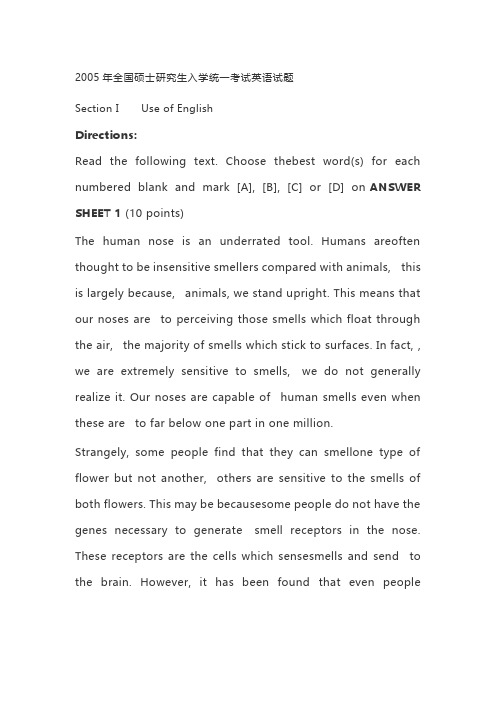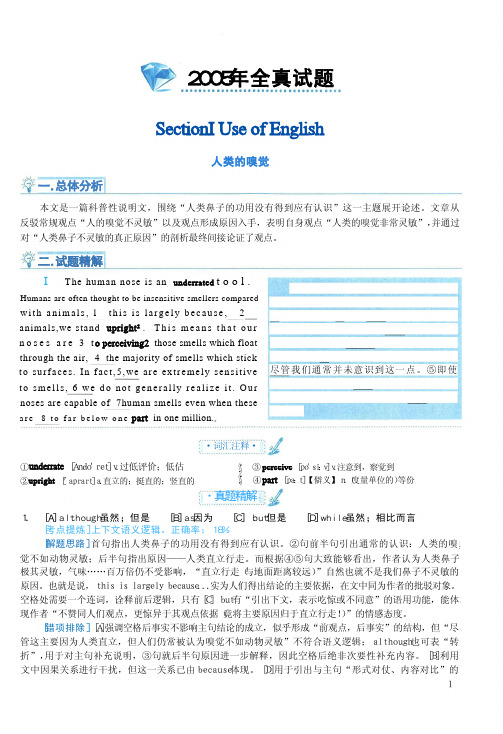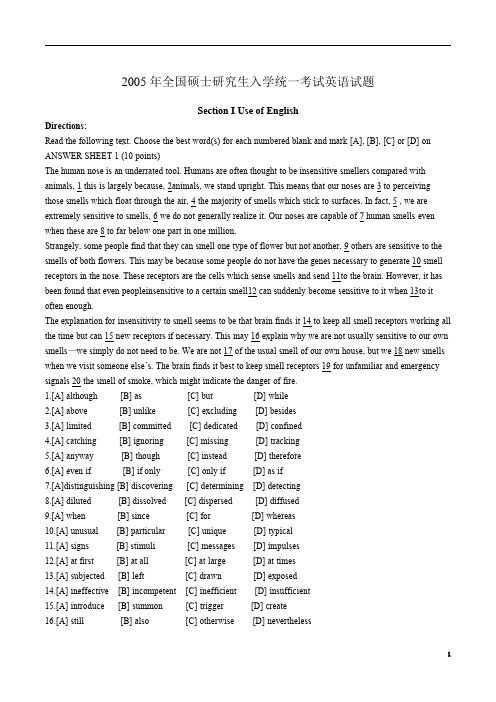2005年考研英语一阅读理解解析
2005考研英语真题详解

2005考研英语真题详解2005年考研英语真题是考研复习的重要参考资料之一。
通过详细解析这份真题,我们可以更好地理解考试的目标和要求,并为我们的备考提供指导。
本文将对2005年考研英语真题进行详细解析,帮助考生加深对考试内容的理解和掌握。
第一部分:阅读理解在2005年考研英语真题的阅读理解部分,共包含了三篇文章,涉及了不同的主题和内容。
我们将按照文章顺序,逐一进行解析和分析。
文章一文章一是关于环境保护的话题。
通过阅读这篇文章,我们可以了解到环境保护在当时已经成为国际社会关注的焦点。
文章主要讲述了人类活动对环境的破坏和环境问题的危害。
首先,作者指出了人类活动对生态系统造成的破坏,并举例说明了水资源的有限性和污染对人类健康的影响。
接着,文章提到了大气污染对气候变化的影响,并呼吁国际社会共同努力解决环境问题。
文章二文章二是关于教育和学习的话题。
通过阅读这篇文章,我们可以了解到教育的重要性和学习的方法。
首先,作者强调了教育在人类社会中的重要性,并举例说明教育对个人发展的影响。
接着,文章介绍了有效学习的方法,包括积极主动地参与课堂活动和利用多种资源进行学习。
文章三文章三是关于心理学的话题。
通过阅读这篇文章,我们可以了解到心理学的基本概念和应用。
首先,作者介绍了心理学的定义和发展历史,并解释了心理学对人类行为和思维的研究意义。
接着,文章讲述了应用心理学在解决社会问题和提高人们生活质量中的作用。
第二部分:长篇阅读理解在2005年考研英语真题的长篇阅读理解部分,共有两篇文章,涉及了不同的主题和内容。
我们将按照文章顺序,逐一进行解析和分析。
文章一文章一是关于经济发展的话题。
通过阅读这篇文章,我们可以了解到经济发展的影响和挑战。
首先,作者提到了快速经济发展给环境和资源造成的压力,并探讨了如何平衡经济发展和环境保护之间的关系。
接着,文章讨论了经济发展对社会结构和就业的影响,并提出了解决就业问题的思路和建议。
文章二文章二是关于健康与饮食的话题。
2005年英语一考研真题

2005年英语一考研真题2005年的英语一考研真题是考察考生在英语阅读和写作方面的能力。
以下是对真题内容的分析和解答。
阅读理解第一篇阅读理解文章是关于谚语和俚语的,考察考生对于英语语言的了解和运用能力。
文章介绍了谚语和俚语的定义和功能,并列举了一些常见的例子。
谚语和俚语是一门语言的精华,它们能够简洁而生动地传达出丰富的意义和情感。
掌握了谚语和俚语,我们就能更好地理解和运用英语,增强自己的语言表达能力。
第二篇阅读理解文章是关于马克思主义哲学的,考察对于哲学思想和理论的理解和应用能力。
文章介绍了马克思主义哲学的起源和基本原理,阐述了唯物辩证法和历史唯物主义等重要概念。
马克思主义哲学是一种科学的思想武器,它帮助我们理解社会现象和人类历史的发展规律。
掌握了马克思主义哲学,我们就能更好地分析和解决社会问题,提高自己的思维能力和创新意识。
写作写作部分要求考生根据给出的提示,针对一个话题进行写作。
在这个题目中,我们以“环境保护”为例进行讨论。
环境保护是当今社会面临的重要问题之一。
人类的经济发展和生活方式带来了环境问题的同时,也给我们敲响了警钟。
怎样保护环境、改善生态环境已经成为全人类的共同责任。
以下是一些建议和观点供参考。
首先,政府应该出台更加严格的环境保护法律和政策。
在立法和执法方面加大力度,对环境犯罪行为进行打击和处罚。
同时,加强环境监测和治理,确保环境质量的改善。
其次,公众的环保意识需得到进一步的提高。
通过教育宣传和媒体的力量,增强人们的环境保护意识,培养人们爱护环境的习惯和行为。
此外,倡导绿色消费和可持续发展的生活方式,降低对环境的影响。
第三,加强技术创新和产业转型,推动绿色发展。
发展清洁能源和循环经济,减少污染物的排放和资源的浪费。
推动可持续发展的产业和经济模式,实现经济发展和环境保护的双赢。
最后,国际合作和共同努力是解决环境问题的关键。
全球变暖、气候变化等环境挑战需要各国共同应对。
加强国际合作,分享环保经验和技术,制定共同的环境保护目标和行动计划。
2005年考研阅读理解与解析

2005年 Text 1Everybody loves a fat pay rise. Yet pleasure at your own can vanish if you learn that a colleague has been given a bigger one. Indeed, if he has a reputation for slacking, you might even be outraged. Such behaviour is regarded as “all too human,” with the underlying assumption that other animals would not be capable of this finely developed sense of grievance. But a study by Sarah Brosnan and Frans de Waal of Emory University in Atlanta, Georgia, which has just been published in Nature, suggests that it is all too monkey, as well.人人都喜欢大幅加薪,但是当你知道一个同事薪水加得比你还要多的时候,那么加薪带给你的喜悦感就消失的无影无踪了。
如果他还以懒散出名的话,你甚至会变得怒不可遏。
这种行为被看作是“人之常情”,其潜在的假定其他动物不可能具有如此高度发达的不满意识。
但是由佐治亚州亚特兰大埃里莫大学的Sarah Brosnan 和Frans de Waal进行的一项研究表明,它也是“猴之常情”。
这项研究成果刚刚发表在《自然》杂志上。
The researchers studied the behaviour of female brown capuchin monkeys. They look cute. They are good-natured, co-operative creatures, and they share their food readily. Above all, like their female human counterparts, they tend to pay much closer attention to the value of “goods and services” than males.研究者们对雌性棕色卷尾猴的行为进行了研究。
2005年考研英语一全真试题精解

2005年考研英语一全真试题精解
阅读理解:
1. 文章主旨:文章讲述了网络搜索引擎对现代社会信息获取方式的影响。
2. 答案详解:
文章首先描述了互联网搜索引擎的出现及其带来的便利,如信息检索速度的加快、信息量的增加等。
文章接着提到搜索引擎的局限性,如信息质量的参差不齐、虚假信息的存在等。
最后,文章指出人们应该具备一定的信息筛选和辨别能力,以应对搜索引擎带来的信息过载问题。
3. 正确答案:C. The impact of search engines on modern information retrieval.
翻译:
原文:尽管存在诸多争议,搜索引擎已经成为我们获取信息的主要工具。
译文:Despite numerous controversies, search engines have become the primary tool for us to acquire information.
解析:该句子的翻译较为简单,主要考察了“尽管”的翻译和“获取信息”的表述方式。
译文准确传达了原文的含义,没有出现语法错误或词汇错误。
2005考研英语一真题答案解析

2005年全国硕士研究生入学统一考试英语试题Section I Use of EnglishDirections:Read the following text. Choose thebest word(s) for each numbered blank and mark [A], [B], [C] or [D] on ANSWER SHEET 1 (10 points)The human nose is an underrated tool. Humans areoften thought to be insensitive smellers compared with animals, this is largely because, animals, we stand upright. This means that our noses are to perceiving those smells which float through the air, the majority of smells which stick to surfaces. In fact, , we are extremely sensitive to smells, we do not generally realize it. Our noses are capable of human smells even when these are to far below one part in one million.Strangely, some people find that they can smellone type of flower but not another, others are sensitive to the smells of both flowers. This may be becausesome people do not have the genes necessary to generate smell receptors in the nose. These receptors are the cells which sensesmells and send to the brain. However, it has been found that even peopleinsensitiveto a certain smell can suddenly become sensitive to it when to it often enough.The explanation for insensitivity to smell seemsto be that the brain finds it to keep all smell receptors working all the time but can new receptors if necessary. This may explain why we are not usually sensitive to our own smells—we simplydo not need to be. We are not of the usual smell of our own house, but we new smells when we visit someone else’s. The brain finds it best tokeep smell receptors for unfamiliar and emergency signals the smell of smoke, which might indicate the danger of fire.1. [A]although[B] as[C] but[D] while2. [A]above[B] unlike[C] excluding[D] besides3. [A]limited[B] committed[C] dedicated[D] confined4. [A]catching[B] ignoring[C] missing[D] tracking5. [A]anyway[B] though[C] instead[D] therefore6. [A]even if[B] if only[C] only if[D] as if7. [A]distinguishing[B] discovering[C] determining[D] detecting8. [A]diluted[B] dissolved[C] dispersed[D] diffused9. [A]when[B] since[C] for[D] whereas10. [A]unusual[B] particular[C] unique[D] typical11. [A]signs[B] stimuli[C] messages[D] impulses12. [A]at first[B] at all[C] at large[D] at times13. [A]subjected[B] left[C] drawn[D] exposed14. [A]ineffective[B] incompetent[C] inefficient[D] insufficient15. [A]introduce[B] summon[C] trigger[D] create16. [A]still[B] also[C] otherwise[D] nevertheless17. [A]sure[B] sick[C] aware[D] tired18. [A]tolerate[B] repel[C] neglect[D] notice19. [A]available[B] reliable[C] identifiable[D] suitable20. [A]similar to[B] such as[C] along with[D] aside fromSection II Reading ComprehensionPart ADirections:Read the following four texts. Answerthe questions below each text by choosing [A], [B], [C] or D. Mark your answerson ANSWER SHEET 1 (40 points)Text 1Everybody loves a fat pay rise. Yet pleasure atyour own can vanish if you learn that a colleague has been given a bigger one. Indeed,if he has a reputation for slacking, you might even be outraged. Such behaviouris regarded as “all too human,”with the underlying assumption that other animalswould not be capable of this finely developed sense of grievance. But a study bySarah Brosnan and Frans de Waal of Emory University in Atlanta, Georgia, which hasjust been published in Nature, suggeststhat it is all too monkey, as well.The researchers studied the behaviour of femalebrown capuchin monkeys. They look cute. They are good-natured, co-operative creatures,and they share their food readily. Above all, like their female human counterparts,they tend to pay much closer attention to the value of “goods and services”thanmales.Such characteristics make them perfect candidatesfor Dr. Brosnan’s and Dr. de Waal’s study. The researchers spent two years teachingtheir monkeys to exchange tokens for food. Normally, the monkeys were happy enoughto exchange pieces of rock for slices of cucumber. However, when two monkeys wereplaced in separate but adjoining chambers, so that eachcould observe what the otherwas getting in return for its rock, their behaviour became markedly different.In the world of capuchins, grapes are luxury goods(and much preferable to cucumbers). So when one monkey was handed a grape in exchangefor her token, the second was reluctant to hand hers over for a mere piece of cucumber.And if one received a grape without having to provide her token in exchange at all,the other either tossed her own token at the researcher or out of the chamber, orrefused to accept the slice of cucumber. Indeed, the mere presence of a grape inthe other chamber (without an actual monkey to eat it) was enough to induce resentmentin a female capuchin.The researchers suggest that capuchin monkeys,like humans, are guided by social emotions. In the wild, they are a co-operative,group-living species. Such co-operation is likely to be stable only when each animalfeels it is not being cheated. Feelings of righteous indignation, it seems, arenot the preserve of people alone. Refusing a lesser reward completely makes thesefeelings abundantly clear to other members of the group. However, whether such asense of fairness evolved independently in capuchins and humans, or whether itstemsfrom the common ancestor that the species had 35 million years ago, is, as yet,an unanswered question.21. Inthe opening paragraph, the author introduces histopic by ________.[A] posing a contrast[B] justifying an assumption[C] making a comparison[D] explaining a phenomenon22. Thestatement “it is all too monkey”(Last line,Paragraph l) implies that________.[A] monkeys are also outraged by slack rivals[B] resenting unfairness is also monkeys’nature[C] monkeys, like humans, tend to be jealousof eachother[D] no animals other than monkeys can developsuchemotions23. Femalecapuchin monkeys were chosen for theresearch most probably because they are________.[A] more inclined to weigh what they get[B] attentive to researchers’instructions[C] nice in both appearance and temperament[D] more generous than their male companions24. Dr.Brosnan and Dr. de Waal have eventually found intheir study that the monkeys________.[A] prefer grapes to cucumbers[B] can be taught to exchange things[C] will not be co-operative if feeling cheated[D] are unhappy when separated from others25. Whatcan we infer from the last paragraph?[A] Monkeys can be trained to develop socialemotions.[B] Human indignation evolved from an uncertainsource.[C] Animals usually show their feelings openlyas humansdo.[D] Cooperation among monkeys remains stableonly inthe wild.Text 2Do you remember all those years when scientistsargued that smoking would kill us but the doubters insisted that we didn’t knowfor sure? That the evidence was inconclusive, the science uncertain? That the antismokinglobby was out to destroy ourway of life and the government should stay out of theway? Lots of Americans bought that nonsense, and over three decades, some 10 millionsmokers went to early graves.There are upsetting parallels today, as scientistsin one wave after another try to awaken us to the growing threat of global warming.The latest was a panel from the National Academy of Sciences, enlisted by the WhiteHouse, to tell us that the Earth’s atmosphere is definitely warming and that theproblem is largely man-made. The clear message is that we should get moving to protectourselves. The president of the National Academy, Bruce Alberts, addedthis key point in the preface to the panel’s report: “Science never has all theanswers. But science does provide us with the best available guide to the future,and it is critical that our nation and the world base important policies on thebest judgments that science can provide concerning the future consequences of presentactions.”Just as on smoking, voices now come from manyquarters insisting that the science about global warming is incomplete, that it’sOK to keep pouring fumes into the air until we know for sure. This is a dangerousgame: by the time 100 percent of the evidence is in, it may be too late. With therisks obvious andgrowing, a prudent people would take out an insurance policy now.Fortunately, the White House is starting to payattention. But it’s obvious that a majority of the president’s advisers still don’ttake global warming seriously. Instead of a plan of action, they continue to pressfor more research -- a classic case of “paralysis by analysis.”To serve as responsible stewards of the planet,we must press forward on deeper atmospheric and oceanic research. But research aloneis inadequate. If the Administration won’t take the legislative initiative, Congressshould help to begin fashioning conservation measures. A bill by Democratic SenatorRobert Byrd of West Virginia,which would offer financial incentives for private industry, is a promising start.Many see that the country is getting ready to build lots of new power plants tomeet our energy needs. If we are ever going to protect the atmosphere, it is crucialthat those new plants be environmentally sound.26. Anargument made by supporters of smoking was that________.[A] there was no scientific evidence of thecorrelationbetween smoking and death[B] the number of early deaths of smokersin the pastdecades was insignificant[C] people had the freedom to choose theirown way oflife[D] antismoking people were usually talkingnonsense27. Accordingto Bruce Alberts, science can serve as ________.[A] a protector[B] a judge[C] a critic[D] a guide28. Whatdoes the author mean by “paralysis by analysis”(Last line, Paragraph 4)?[A] Endless studies kill action.[B] Careful investigation reveals truth.[C] Prudent planning hinders progress.[D] Extensive research helps decision-making.29. Accordingto the author, what should theAdministration do about global warming?[A] Offer aid to build cleaner power plants.[B] Raise public awareness of conservation.[C] Press for further scientific research.[D] Take some legislative measures.30. Theauthor associates the issue of global warming withthat of smoking because________.[A] they both suffered from the government’snegligence[B] a lesson from the latter is applicableto the former[C] the outcome of the latter aggravates theformer[D] both of them have turned from bad to worseText 3Of all the components of a good night’s sleep,dreams seem to be least within our control. In dreams, a window opens into a worldwhere logic is suspended and dead people speak. A century ago, Freud formulatedhis revolutionary theory that dreams were the disguised shadows of our unconsciousdesires and fears; by the late 1970s, neurologists had switched to thinking of themas just “mental noise”-- the randombyproducts of the neural-repair work that goeson during sleep. Now researchers suspect that dreams are part of the mind’s emotionalthermostat, regulating moods while the brain is “off-line.”And one leading authoritysays that these intensely powerful mental events can be not only harnessed but actuallybrought under conscious control, to help us sleep and feel better, “It’s your dream,”says Rosalind Cartwright, chair of psychology at Chicago’sMedical Center. “If you don’t like it, change it.”Evidence from brain imaging supports this view.The brain is as active during REM (rapid eye movement) sleep -- when most vividdreams occur -- as it is when fully awake, says Dr, Eric Nofzinger at the University of Pittsburgh. But not all parts of the brainare equally involved; the limbic system (the “emotional brain”) is especially active,while the prefrontal cortex (the center of intellect and reasoning) is relativelyquiet. “We wake up from dreams happy or depressed, and those feelings can stay withus all day.”says Stanford sleep researcher Dr. William Dement.The link between dreams and emotions shows upamong the patients in Cartwright’s clinic. Most people seem to have more baddreams early in the night, progressing toward happier onesbefore awakening,suggesting that they are working through negative feelings generated during theday. Because our conscious mind is occupied with daily life we don’t alwaysthink about the emotional significance of the day’s events -- until, itappears, we begin to dream.And this process need not be left to the unconscious.Cartwright believes one can exercise conscious control over recurring bad dreams.As soon as you awaken, identify what is upsetting about the dream. Visualize howyou would like it to end instead; the next time it occurs, try to wake up just enoughto control its course. With much practice people can learn to, literally, do itin their sleep.At the end of the day, there’s probably littlereason to pay attention to our dreams at all unless they keep us from sleeping or“we wake up in a panic,”Cartwright says. Terrorism, economic uncertainties andgeneral feelings of insecurity have increased people’s anxiety. Those sufferingfrom persistent nightmares should seek help from a therapist. For the rest of us,the brain has its ways of working through bad feelings. Sleep -- or rather dream-- on it and you’ll feel better in the morning.31. Researchershave come to believe that dreams ________.[A] can be modified in their courses[B] are susceptible to emotional changes[C] reflect our innermost desires and fears[D] are a random outcome of neural repairs32. Byreferring to the limbic system, the author intends to show ________.[A] its function in our dreams[B] the mechanism of REM sleep[C] the relation of dreams to emotions[D] its difference from the prefrontal cortex33. Thenegative feelings generated during the day tend to ________.[A] aggravate in our unconscious mind[B] develop into happy dreams[C] persist till the time we fall asleep[D] show up in dreams early at night34. Cartwrightseems to suggest that ________.[A] waking up in time is essential to theridding of baddreams[B] visualizing bad dreams helps bring themundercontrol[C] dreams should be left to their naturalprogression[D] dreaming may not entirely belong totheunconscious35. Whatadvice might Cartwright give to those whosometimes have bad dreams?[A] Lead your life as usual.[B] Seek professional help.[C] Exercise conscious control.[D] Avoid anxiety in the daytime.Text 4Americans no longer expect public figures, whetherin speech or in writing, to command the English language with skill and gift. Nordo they aspire to such command themselves. In his latest book, Doing Our Own Thing: The Degradation ofLanguage and Music and Why We Should, Like, Care, John McWhorter, a linguistand controversialist of mixed liberal and conservative views, sees the triumph of1960s counter-culture as responsible for the decline of formal English.Blaming the permissive 1960s is nothing new,but this is not yet another criticism against the decline in education. Mr.McWhorter’s academic speciality is language history and change, and he sees thegradual disappearance of “whom,”for example, to be natural and no moreregrettable than the loss of the case-endings of Old English.But the cult of the authentic and the personal,“doing our own thing,”has spelt the death of formal speech, writing, poetry andmusic. While even the modestly educated sought an elevated tone when they put pento paper before the 1960s, even the most well regarded writing since then has soughtto capture spoken English on the page. Equally, in poetry, the highly personal,performative genre is the only form that could claim real liveliness. In both oraland written English, talking is triumphing over speaking, spontaneity overcraft.Illustrated with an entertaining array of examplesfrom both high and low culture, the trend that Mr. McWhorter documents is unmistakable.But it is less clear, to take the question of his subtitle, why we should, like,care. As a linguist, he acknowledges that all varieties of human language, includingnon-standard ones like Black English, can be powerfully expressive -- there existsno language or dialect inthe world that cannot convey complex ideas. He is notarguing, as many do, that we can no longer think straight because we do not talkproper.Russians have a deep love for their own languageand carry large chunks of memorized poetry in their heads, while Italian politicianstend to elaborate speech that would seem old-fashioned to most English-speakers.Mr. McWhorter acknowledges that formal language is not strictly necessary, and proposesno radical education reforms -- he is really grieving over the loss of somethingbeautiful more than useful. We now take our English “on paper plates instead ofchina.”A shame, perhaps, but probably an inevitable one.36. Accordingto McWhorter, the decline of formal English________.[A] is inevitable in radical education reforms[B] is but all too natural in language development[C] has caused the controversy over the counter-culture[D] brought about changes in public attitudesin the1960s37. Theword “talking”(Line 6, Paragraph 3) denotes________.[A] modesty[B] personality[C] liveliness[D] informality38. Towhich of the following statements would McWhorter most likely agree?[A] Logical thinking is not necessarily relatedto the waywe talk.[B] Black English can be more expressive thanstandardEnglish.[C] Non-standard varieties of human languageare justas entertaining.[D] Of all the varieties, standard Englishcan best conveycomplex ideas.39. Thedescription of Russians’love of memorizing poetry shows the author’s ________.[A] interest in their language[B] appreciation of their efforts[C] admiration for their memory[D] contempt for their old-fashionedness40. Accordingto the last paragraph, “paper plates”is to“china”as ________.[A] “temporary”is to “permanent”[B] “radical”is to “conservative”[C] “functional”is to “artistic”[D] “humble”is to “noble”Part BDirections:In the following text, some sentenceshave been removed. For Questions 41-45, choose the most suitable one from thelist A-G to fit into each of the numbered blanks. There are two extra choices,which do not fit in any of the gaps. Mark your answers on ANSWER SHEET 1. (10 points)Canada’s premiers (the leaders of provincial governments),if they have any breath left after complaining about Ottawa at their late July annualmeeting, might spare a moment to do something, together, to reduce health-care costs.They’re all groaning about soaring health budgets,the fastest-growing component of which are pharmaceutical costs.41. ________What to do? Both the Romanow commission and theKirby committee on health care -- to say nothing of reports from other experts-- recommended the creation of a national drug agency. Instead of each provincehaving its own list of approved drugs, bureaucracy, procedures and limited bargainingpower, all would pool resources, work with Ottawa, and create a national institution.42. ________But “national”doesn’t have to mean that. “National”could mean interprovincial -- provinces combining efforts to create one body.Either way, one benefit of a “national”organizationwould be to negotiate better prices, if possible, with drug manufacturers. Insteadof having one province -- or a series of hospitals within a province -- negotiatea price for a given drug on the provincial list, the national agency would negotiateon behalf of all provinces.Rather than, say, Quebec, negotiating on behalf of seven millionpeople, the national agency would negotiate on behalf of 31 million people. Basiceconomics suggests the greater the potential consumers, the higher the likelihoodof a better price.43. ________A small step has been taken in the direction ofa national agency with the creation of the Canadian Co-ordinating Office for HealthTechnology Assessment, funded by Ottawaand the provinces. Under it, a Common Drug Review recommends to provincial listswhich new drugs should be included. Predictably, and regrettably, Quebec refused to join.A few premiers are suspicious of any federal-provincialdeal-making. They (particularly Quebec and Alberta) just want Ottawato fork over additional billions with few, if any, strings attached. That’s onereason why the idea of a national list hasn’t gone anywhere, while drug costs keeprising fast.44. ________Premiers love to quote Mr. Romanow’s report selectively,especially the parts about more federal money. Perhaps they should read what hehad to say about drugs: “A national drug agency would provide governments more influenceon pharmaceutical companies in order to constrain the ever-increasing cost of drugs.”45. ________So when the premiers gather in Niagara Falls to assemble theirusual complaint list, they should also get cracking aboutsomething in their jurisdictionthat would help their budgets and patients.[A] Quebec’s resistance to a national agency isprovincialistideology. One of the first advocates for anational list was a researcher at Laval University.Quebec’s DrugInsurance Fund has seen its costs skyrocket withannual increases from 14.3 percent to 26.8 per cent![B] Or they could read Mr. Kirby’s report:“the substantialbuying power of such an agency would strengthen thepublicprescription-drug insurance plans to negotiatethe lowest possible purchaseprices from drugcompanies.”[C] What does “national”mean? RoyRomanow andSenator Michael Kirby recommended a federal-provincial body muchlike the recently created NationalHealth Council.[D] The problem is simple and stark:health-care costshave been, are, and will continue to increase fasterthangovernment revenues.[E] According to the Canadian Institute forHealthInformation, prescription drug costs have risen since1997 at twice the rateof overall health-care spending.Part of the increase comes from drugs being usedtoreplace other kinds of treatments. Part of it arises fromnew drugs costing morethan older kinds. Part of it ishigher prices.[F] So, if the provinces want to run the health-careshow,they should prove they can run it, starting with aninterprovincial healthlist that would end duplication,save administrative costs, prevent one provincefrombeing played off against another, and bargain for betterdrug prices.[G] Of course, the pharmaceutical companieswill scream.They like divided buyers; they can lobby better that way.They canuse the threat of removing jobs from oneprovince to another. They can hope that,if one provinceincludes a drug on its list, the pressure will cause othersto includeit on theirs. They wouldn’t like a nationalagency, but self-interest would leadthem to deal with it. Part CDirections:Read the following text carefully andthen translate the underlined segments into Chinese. Your translation should bewritten clearly on ANSWER SHEET 2.(10 points)It is not easy to talk about the role of the massmedia in this overwhelmingly significant phase in European history. History andnews become confused, and one’s impressions tend to be a mixture of skepticism andoptimism. 46) Television is one of the means by which these feelings arecreated and conveyed -- and perhaps never before has it served so much toconnect different peoples and nations as in the recent events in Europe. The Europe thatis now forming cannot be anything other than its peoples, their cultures and nationalidentities. With this in mind we can begin to analyze the European television scene.47) In Europe, as elsewhere, multi-mediagroups have been increasingly successful: groups which bring togethertelevision, radio, newspapers, magazines and publishing houses that work inrelation to one another. One Italian example would be the Berlusconi group,while abroad Maxwell and Murdoch come to mind.Clearly, only the biggest and most flexible televisioncompanies are going to be able to compete in such a rich and hotly-contested market.48) This alone demonstrates that the television business is not an easyworld to survive in, a fact underlined by statistics that show that out ofeighty European television networks, no less than 50% took a loss in 1989.Moreover, the integration of the European communitywill oblige television companies to cooperate more closely in terms of both productionand distribution.49) Creating a “European identity”thatrespects the different cultures and traditions which go to make up the connectingfabric of the Old Continent is no easy task and demands a strategic choice-- that of producing programs in Europe for Europe.This entails reducing our dependence on the North American market, whose programsrelate to experiences and cultural traditions which are different from our own.In order to achieve these objectives, we mustconcentrate more on co-productions, the exchange of news, documentary services andtraining. This also involves the agreements between European countries for the creationof a European bank for Television Production which, on the model of theEuropean Investments Bank, will handle the finances necessary for production costs.50) In dealing with a challenge on such a scale, it is no exaggeration tosay “United we stand, divided we fall” -- and if I had to choose a sloganit would be “Unity in our diversity.”A unity of objectives that nonetheless respectthe varied peculiarities of each country.Section III WritingPart A51. Directions:Two months ago you got a job as an editor forthe magazine Designs & Fashions. Butnow you find that the work is not what you expected. You decide to quit. Write aletter to your boss, Mr. Wang, telling him your decision, stating your reason (s),and making an apology.Write your letter with no less than 100 words.Write it neatly on ANSWER SHEET 2.Do not sign your own name at the end of theletter; use “Li Ming”instead.You do not need to write the address. (10points)Part B52. Directions:Write an essay of 160-200 words basedon the following drawing. In your essay, you should first describe the drawing,then interpret its meaning, and give your comment on it.You should write neatly on ANSWER SHEET 2. (20 points) 2005年考研英语真题答案Section I: Use of English(10 points)Part C (10 points)46. 电视是创造和传递感情的手段之一。
2005年考研英语真题解析

2005年全真试题SectionI Use of English 人类的嗅觉一.总体分析对“人类鼻子不灵敏的真正原因”的剖析最终间接论证了观点。
反驳常规观点“人的嗅觉不灵敏”以及观点形成原因入手,表明自身观点“人类的嗅觉非常灵敏”,并通过本文是一篇科普性说明文,围绕“人类鼻子的功用没有得到应有认识”这一主题展开论述。
文章从二.试题精解a e 8 t o f a r b e l o w o n e in one million.part noses are capable of 7human smells even when these t s m e l s , 6 w e d o n o t g e n e r a l l e a l i z e i t. O u t o s u r f a c e s. I n f a c t ,5,w e a r e e x t r e m e l y s e n s i t i v e through the air, 4 the majority of smells which stickn o s e s a r e 3 t those smells which float o perceiving2animals,we stand . T h i s m e a n s t h a t o u r upright²w i t h a n i m a l s , l t h i s i s l a r g e l y b e c a u s e, 2Humans are often thought to be insensitive smellers compared I The human nose is an t o o l . underrated 的存在。
万分之一,我们的鼻子仍然能够察觉到它们把人类气味的浓度稀释到远不及原来的百尽管我们通常并未意识到这一点。
2005年考研英语真题及解析(1)

when we visit someone else’s. The brain finds it best to keep smell receptors 19 for unfamiliar and emergency
2005年考研英语完型阅读精解

2005年全国硕士研究生入学统一考试英语(一)试题答案详解Section I Use of English (10 points)1-5. CBACB 6-10. ADADB 11-15. CADCD 16-20. BCDABSection II Reading Comprehension (60 points)Part A (40 points) 21-25. CBACB 26-30. CDADB 31-35. ACDDA 36-40. BDABC Part B (10 points) 4 1-45. ECGFB Part C (10 points)46. 电视是创造和传递感情的手段之一。
也许在此之前,就加强不同的民族和国家之间的联系而言,电视还从来没有像在最近的欧洲事件中起过如此大的作用。
47. 多媒体集团在欧洲就像在其他地方一样越来越成功了。
这些集团把相互关系密切的电视台、电台、报纸、杂志、出版社整合到了一起。
48. 仅这一点就表明在电视行业不是一个容易生存的领域。
这个事实通过统计数字一目了然,统计表明在80家欧洲电视网中1989年出现亏损的不少于50%。
49. 创造一个尊重不同文化和传统的“欧洲统一体”绝非易事,需要战略性选择。
正是这些文化和传统组成了连接欧洲大陆的纽带。
50. 在应付一个如此规模的挑战过程中,我们可以毫不夸张地说,“团结,我们就会站起来;分裂,我们就会倒下去。
”Section I Use of English1. C 空格前讲的是,和动物相比,人的嗅觉常被认为不灵敏,空格后讲的是,…这主要是因为,…动物,我们是直立的。
由本段首句"人的鼻子是一个被低估的工具"可知,作者并不认同"人的嗅觉没有动物的灵敏"这一有关人类嗅觉的常规观点。
由此可推知,空格前后部分存在隐形的转折关系,即作者并不认为人的鼻子不灵敏,只不过因为人是直立的,故正确答案为C项。
- 1、下载文档前请自行甄别文档内容的完整性,平台不提供额外的编辑、内容补充、找答案等附加服务。
- 2、"仅部分预览"的文档,不可在线预览部分如存在完整性等问题,可反馈申请退款(可完整预览的文档不适用该条件!)。
- 3、如文档侵犯您的权益,请联系客服反馈,我们会尽快为您处理(人工客服工作时间:9:00-18:30)。
2005年考研英语一阅读理解解析
摘要:
1.解析2005年考研英语一阅读理解的文章特点
2.分析文章主题及难点
3.提供解题技巧和策略
4.总结如何提高阅读理解能力
正文:
一、解析2005年考研英语一阅读理解的文章特点
2005年考研英语一阅读理解部分共有四篇文章,分别是自然科学、社会科学、人文科学和商业经济类文章。
本文将以其中一篇为例,分析其文章结构、难易程度和考查点。
二、分析文章主题及难点
以2005年考研英语一阅读理解第一篇文章为例,该文章探讨了全球化对美国制造业的影响。
文章通过对比过去和现在的制造业状况,指出全球化使得美国制造业面临巨大的竞争压力,许多企业不得不调整战略以应对这一挑战。
文章中的难点包括一些专有名词和长难句,需要考生具备较强的词汇和语法功底。
三、提供解题技巧和策略
1.浏览题干,确定文章主题和考查点。
在开始阅读文章之前,先浏览一遍题干,了解文章的主题和考查点,以便在阅读过程中有针对性地寻找答案。
2.抓住文章主旨和段落大意。
在阅读过程中,注意把握文章的主旨和各段
落的大意,这将有助于理解文章的结构和逻辑关系。
3.善于寻找关键词和信号词。
在解题时,注意寻找文章中的关键词和信号词,如转折词、因果关系词等,这些词语往往有助于找到答案。
4.分析选项,排除干扰项。
在做题时,要对选项进行仔细分析,排除那些与文章内容不符或语法错误的选项。
四、总结如何提高阅读理解能力
1.扩大词汇量。
词汇是阅读理解的基础,要想提高阅读能力,首先要扩大词汇量。
可以通过背单词书、阅读英文文章、观看英文电影等方式来积累词汇。
2.加强语法学习。
语法是阅读理解的基石,掌握基本的语法知识有助于更好地理解文章。
3.培养阅读习惯。
每天花一定时间阅读英文文章,逐渐提高阅读速度和理解能力。
4.做真题练习。
通过做历年考研英语真题,了解考试题型和考查重点,提高应试能力。
5.学习解题技巧。
掌握一定的解题技巧和方法,提高答题效率。
总之,要提高考研英语阅读理解能力,需要长期积累、不断练习。
